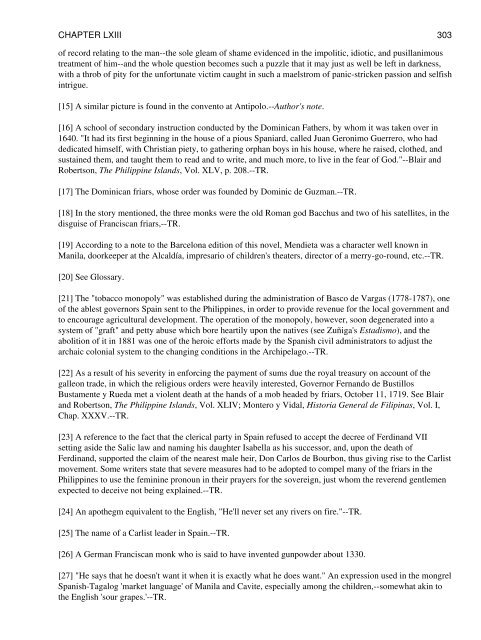The Social Cancer, by José Rizal - Home
The Social Cancer, by José Rizal - Home
The Social Cancer, by José Rizal - Home
You also want an ePaper? Increase the reach of your titles
YUMPU automatically turns print PDFs into web optimized ePapers that Google loves.
CHAPTER LXIII 303<br />
of record relating to the man--the sole gleam of shame evidenced in the impolitic, idiotic, and pusillanimous<br />
treatment of him--and the whole question becomes such a puzzle that it may just as well be left in darkness,<br />
with a throb of pity for the unfortunate victim caught in such a maelstrom of panic-stricken passion and selfish<br />
intrigue.<br />
[15] A similar picture is found in the convento at Antipolo.--Author's note.<br />
[16] A school of secondary instruction conducted <strong>by</strong> the Dominican Fathers, <strong>by</strong> whom it was taken over in<br />
1640. "It had its first beginning in the house of a pious Spaniard, called Juan Geronimo Guerrero, who had<br />
dedicated himself, with Christian piety, to gathering orphan boys in his house, where he raised, clothed, and<br />
sustained them, and taught them to read and to write, and much more, to live in the fear of God."--Blair and<br />
Robertson, <strong>The</strong> Philippine Islands, Vol. XLV, p. 208.--TR.<br />
[17] <strong>The</strong> Dominican friars, whose order was founded <strong>by</strong> Dominic de Guzman.--TR.<br />
[18] In the story mentioned, the three monks were the old Roman god Bacchus and two of his satellites, in the<br />
disguise of Franciscan friars,--TR.<br />
[19] According to a note to the Barcelona edition of this novel, Mendieta was a character well known in<br />
Manila, doorkeeper at the Alcaldía, impresario of children's theaters, director of a merry-go-round, etc.--TR.<br />
[20] See Glossary.<br />
[21] <strong>The</strong> "tobacco monopoly" was established during the administration of Basco de Vargas (1778-1787), one<br />
of the ablest governors Spain sent to the Philippines, in order to provide revenue for the local government and<br />
to encourage agricultural development. <strong>The</strong> operation of the monopoly, however, soon degenerated into a<br />
system of "graft" and petty abuse which bore heartily upon the natives (see Zuñiga's Estadismo), and the<br />
abolition of it in 1881 was one of the heroic efforts made <strong>by</strong> the Spanish civil administrators to adjust the<br />
archaic colonial system to the changing conditions in the Archipelago.--TR.<br />
[22] As a result of his severity in enforcing the payment of sums due the royal treasury on account of the<br />
galleon trade, in which the religious orders were heavily interested, Governor Fernando de Bustillos<br />
Bustamente y Rueda met a violent death at the hands of a mob headed <strong>by</strong> friars, October 11, 1719. See Blair<br />
and Robertson, <strong>The</strong> Philippine Islands, Vol. XLIV; Montero y Vidal, Historia General de Filipinas, Vol. I,<br />
Chap. XXXV.--TR.<br />
[23] A reference to the fact that the clerical party in Spain refused to accept the decree of Ferdinand VII<br />
setting aside the Salic law and naming his daughter Isabella as his successor, and, upon the death of<br />
Ferdinand, supported the claim of the nearest male heir, Don Carlos de Bourbon, thus giving rise to the Carlist<br />
movement. Some writers state that severe measures had to be adopted to compel many of the friars in the<br />
Philippines to use the feminine pronoun in their prayers for the sovereign, just whom the reverend gentlemen<br />
expected to deceive not being explained.--TR.<br />
[24] An apothegm equivalent to the English, "He'll never set any rivers on fire."--TR.<br />
[25] <strong>The</strong> name of a Carlist leader in Spain.--TR.<br />
[26] A German Franciscan monk who is said to have invented gunpowder about 1330.<br />
[27] "He says that he doesn't want it when it is exactly what he does want." An expression used in the mongrel<br />
Spanish-Tagalog 'market language' of Manila and Cavite, especially among the children,--somewhat akin to<br />
the English 'sour grapes.'--TR.


